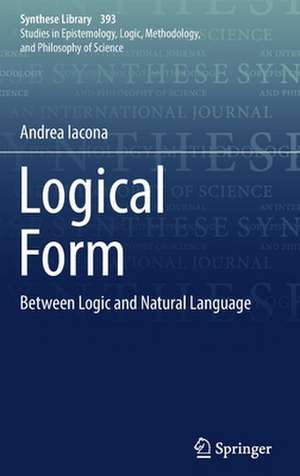Logical Form: Between Logic and Natural Language: Synthese Library, cartea 393
Autor Andrea Iaconaen Limba Engleză Hardback – 7 feb 2018
| Toate formatele și edițiile | Preț | Express |
|---|---|---|
| Paperback (1) | 576.58 lei 6-8 săpt. | |
| Springer International Publishing – 4 iun 2019 | 576.58 lei 6-8 săpt. | |
| Hardback (1) | 582.63 lei 6-8 săpt. | |
| Springer International Publishing – 7 feb 2018 | 582.63 lei 6-8 săpt. |
Din seria Synthese Library
- 15%
 Preț: 638.43 lei
Preț: 638.43 lei - 18%
 Preț: 989.98 lei
Preț: 989.98 lei - 15%
 Preț: 596.69 lei
Preț: 596.69 lei - 18%
 Preț: 903.93 lei
Preț: 903.93 lei - 15%
 Preț: 586.88 lei
Preț: 586.88 lei - 15%
 Preț: 696.50 lei
Preț: 696.50 lei - 18%
 Preț: 892.90 lei
Preț: 892.90 lei - 15%
 Preț: 643.34 lei
Preț: 643.34 lei -
 Preț: 282.33 lei
Preț: 282.33 lei - 5%
 Preț: 372.19 lei
Preț: 372.19 lei -
 Preț: 443.10 lei
Preț: 443.10 lei - 15%
 Preț: 637.59 lei
Preț: 637.59 lei - 18%
 Preț: 958.88 lei
Preț: 958.88 lei - 15%
 Preț: 642.36 lei
Preț: 642.36 lei - 18%
 Preț: 1230.66 lei
Preț: 1230.66 lei - 15%
 Preț: 642.83 lei
Preț: 642.83 lei - 18%
 Preț: 1000.39 lei
Preț: 1000.39 lei -
 Preț: 389.70 lei
Preț: 389.70 lei - 15%
 Preț: 637.28 lei
Preț: 637.28 lei - 18%
 Preț: 952.26 lei
Preț: 952.26 lei - 18%
 Preț: 1231.32 lei
Preț: 1231.32 lei - 15%
 Preț: 645.96 lei
Preț: 645.96 lei -
 Preț: 395.85 lei
Preț: 395.85 lei -
 Preț: 400.47 lei
Preț: 400.47 lei - 18%
 Preț: 1225.48 lei
Preț: 1225.48 lei - 15%
 Preț: 638.89 lei
Preț: 638.89 lei - 18%
 Preț: 1232.09 lei
Preț: 1232.09 lei -
 Preț: 380.45 lei
Preț: 380.45 lei -
 Preț: 394.87 lei
Preț: 394.87 lei - 15%
 Preț: 640.37 lei
Preț: 640.37 lei - 15%
 Preț: 639.08 lei
Preț: 639.08 lei -
 Preț: 381.98 lei
Preț: 381.98 lei - 15%
 Preț: 643.00 lei
Preț: 643.00 lei - 15%
 Preț: 672.29 lei
Preț: 672.29 lei
Preț: 582.63 lei
Preț vechi: 685.45 lei
-15% Nou
Puncte Express: 874
Preț estimativ în valută:
111.49€ • 121.48$ • 93.94£
111.49€ • 121.48$ • 93.94£
Carte tipărită la comandă
Livrare economică 23 aprilie-07 mai
Preluare comenzi: 021 569.72.76
Specificații
ISBN-13: 9783319741536
ISBN-10: 3319741535
Pagini: 132
Ilustrații: VIII, 133 p.
Dimensiuni: 155 x 235 mm
Greutate: 0.38 kg
Ediția:1st ed. 2018
Editura: Springer International Publishing
Colecția Springer
Seria Synthese Library
Locul publicării:Cham, Switzerland
ISBN-10: 3319741535
Pagini: 132
Ilustrații: VIII, 133 p.
Dimensiuni: 155 x 235 mm
Greutate: 0.38 kg
Ediția:1st ed. 2018
Editura: Springer International Publishing
Colecția Springer
Seria Synthese Library
Locul publicării:Cham, Switzerland
Cuprins
Preface.- 1. The early history of logical form.- 2. The ideal of logical perfection.- 3. Formal languages and natural languages.- 4. Logical form and syntactic structure.- 5. Logical form and truth conditions.- 6. Logical knowledge vs knowledge of logical form.- 7. Validity.- 8. Quanti ed sentences.- 9. Further issues concerning quanti cation.- Afterword.
Recenzii
“Iacona’s book raises interesting and important questions about the role of logical form in logic and philosophy, and about the role of demonstratives in logic and reasoning.” (Geoff Georgi, dialectica, Vol. 72 (4), 2019)
Notă biografică
Andrea Iacona is Professor of Logic at the University of Turin. His main research interests are in logic and philosophy of language. He is the author of Propositions (Name 2002), L'argomentazione (Einaudi 2005, second edition 2010), and Teoria della logica del prim'ordine (with Stefano Cavagnetto), 2010.
Textul de pe ultima copertă
Logical form has always been a prime concern for philosophers belonging to the analytic tradition. For at least one century, the study of logical form has been widely adopted as a method of investigation, relying on its capacity to reveal the structure of thoughts or the constitution of facts. This book focuses on the very idea of logical form, which is directly relevant to any principled reflection on that method. Its central thesis is that there is no such thing as a correct answer to the question of what is logical form: two significantly different notions of logical form are needed to fulfill two major theoretical roles that pertain respectively to logic and to semantics. This thesis has a negative and a positive side. The negative side is that a deeply rooted presumption about logical form turns out to be overly optimistic: there is no unique notion of logical form that can play both roles. The positive side is that the distinction between two notions of logical form, once properly spelled out, sheds light on some fundamental issues concerning the relation between logic and language.
Caracteristici
Provides a clear presentation of the various uses of the term logical form, from the traditional to the more recent Examines the relation between logic and natural language, a classical issue that is crucial to the whole analytic tradition in philosophy Articulates a line of thought that has an enormous impact on some widely debated issues in philosophical logic
